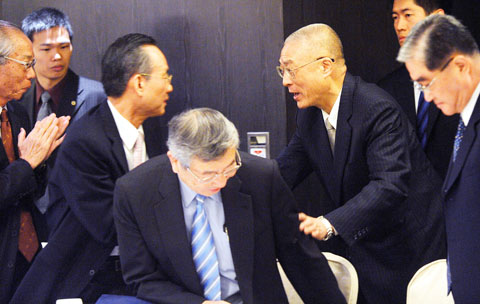Premier Wu Den-yih (吳敦義) yesterday denied speculation that Taiwan would allow Chinese banks to merge with or invest in Taiwanese banks or financial institutions.
Asked to comment on reports that Chinese banks would now be allowed to merge with Taiwan-based banks and financial institutions, Wu told the Taiwan Foreign Correspondents Club that this was not the case.
“So far, it is not the case that Chinese banks can buy Taiwanese banks,” Wu said.

PHOTO: CHIEN JUNG-FONG, TAIPEI TIMES
He said, however, that during talks on a proposed economic cooperation framework agreement (ECFA) between Taiwan and China, discussions could touch on allowing one or two Chinese banks to open branches in Taiwan.
“We might discuss one or two Chinese branches being able to establish themselves in Taiwan,” the premier said, “but there will be no discussions on acquiring Taiwanese banks.”
Wu, who emphasized that the administration would take a “step-by-step” approach to cross-strait agreements, said that an ECFA would not be discussed during the fourth round of talks between the Straits Exchange Foundation and China’s Association for Relations Across the Taiwan Strait in Taichung later this month.
Negotiations on an ECFA, he said, would start at the beginning of next year.
Minister of Economic Affairs Shih Yen-shiang (施顏祥) said later yesterday that the two sides would begin formal negotiations on an ECFA after the Lunar New Year, which falls in mid-February.
Earlier yesterday, Wu told representatives of the Chinese National Association of Industry and Commerce (CNAIC, 工商協進會) that Taiwan’s industrial development would be jeopardized without an ECFA in view of the threats posed by ASEAN Plus One.
With the ASEAN Plus One to take effect next year, the average export tariffs on Taiwanese goods to China will be 9 percent more than those of ASEAN countries — a disadvantage that could put companies off setting up production facilities in Taiwan, he said.
Taiwan will be further marginalized when a free-trade zone is formed among ASEAN with China, South Korea and Japan, he said.
CNAIC chairman Theodore Huang (黃茂雄) said that the government should allay companies’ skepticism on the potential impact of an ECFA and come up with plans to help affected industries.

TARIFFS: The global ‘panic atmosphere remains strong,’ and foreign investors have continued to sell their holdings since the start of the year, the Ministry of Finance said The government yesterday authorized the activation of its NT$500 billion (US$15.15 billion) National Stabilization Fund (NSF) to prop up the local stock market after two days of sharp falls in reaction to US President Donald Trump’s new import tariffs. The Ministry of Finance said in a statement after the market close that the steering committee of the fund had been given the go-ahead to intervene in the market to bolster Taiwanese shares in a time of crisis. The fund has been authorized to use its assets “to carry out market stabilization tasks as appropriate to maintain the stability of Taiwan’s

STEEP DECLINE: Yesterday’s drop was the third-steepest in its history, the steepest being Monday’s drop in the wake of the tariff announcement on Wednesday last week Taiwanese stocks continued their heavy sell-off yesterday, as concerns over US tariffs and unwinding of leveraged bets weighed on the market. The benchmark TAIEX plunged 1,068.19 points, or 5.79 percent, to 17,391.76, notching the biggest drop among Asian peers as it hit a 15-month low. The decline came even after the government on late Tuesday authorized the NT$500 billion (US$15.2 billion) National Stabilization Fund (國安基金) to step in to buoy the market amid investors’ worries over tariffs imposed by US President Donald Trump. Yesterday’s decline was the third-steepest in its history, trailing only the declines of 2,065.87 points on Monday and

TARIFF CONCERNS: The chipmaker cited global uncertainty from US tariffs and a weakening economic outlook, but said its Singapore expansion remains on track Vanguard International Semiconductor Corp (世界先進), a foundry service provider specializing in producing power management and display driver chips, yesterday withdrew its full-year revenue projection of moderate growth for this year, as escalating US tariff tensions raised uncertainty and concern about a potential economic recession. The Hsinchu-based chipmaker in February said revenues this year would grow mildly from last year based on improving supply chain inventory levels and market demand. At the time, it also anticipated gradual quarter revenue growth. However, the US’ sweeping tariff policy has upended the industry’s supply chains and weakened economic prospects for the world economy, it said. “Now

An employment discrimination lawsuit against contract chipmaker Taiwan Semiconductor Manufacturing Co (TSMC, 台積電) might soon be expanded after a hearing in a federal court in San Jose, California, on Tuesday to add 15 plaintiffs to the case. According to a court document, the lawsuit, which was refiled in November last year as a form of a class action with 13 plaintiffs in California, wants to add 15 plaintiffs from Arizona, where TSMC is building up its wafer fab capacity. TSMC first committed between 2020 and last year to invest US$65 billion in three advanced wafer fabs in Arizona. It then pledged an